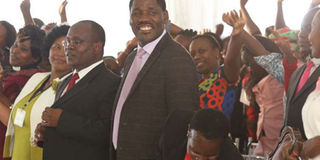We will not let governors massage their egos at Meru conference - senators

Meru Governor Peter Munya (centre) during the launch of Governor's gender roundtable meeting at Meru National Polytechnic on April 07, 2016. Senators have said they will not massage the county bosses' ego at the devolution conference being held in Meru County beginning on April 19, 2016. PHOTO | PHOEBE OKALL | NATION MEDIA GROUP
What you need to know:
- Senators had threatened to boycott the conference but later said they would take the war on impunity and corruption in counties to the governors at the event.
- They accused the governors of using the conference to chest-thump and massage their egos.
Nominated Senator Beatrice Elachi said governors had made the conferences occasions to sing praises for themselves.
Senators on Monday said they will not allow governors to “massage their egos and engage in superiority contests” during the devolution conference starting Tuesday in Meru County.
The lawmakers had earlier threatened to boycott the conference but later said they would take the war on impunity and corruption in counties to the governors at the event.
They said the county bosses had used the other devolution conferences to celebrate themselves and had forgotten to list the challenges being faced and how to make devolution work.
“It is apparent that governors have been using these events to massage their egos, and for superiority contests, and forgetting the bigger devolution picture.
“Senators have said that this needs to be redefined,” the Senate’s Devolution Committee chairman, Prof Wilfred Lesan, told the Nation on the phone Monday.
Nominated Senator Beatrice Elachi said governors had made the conferences occasions to sing praises for themselves.
“Senators want to tell these governors what is really happening. We want to question the huge debts, the wrong decisions being made and the many teething problems in counties. We will not let them engage in chest-thumping,” said Ms Elachi, who attended last year’s conference in Kisumu.
Prof Lesan said the decision to change the course and tone of discussions at the meeting was arrived at when the House discussed concerns from members that they had been ignored in previous conferences.
The Meru event will end on Saturday.
Organisers said the conference will be addressed by President Uhuru Kenyatta, his deputy William Ruto; Namibia’s Prime Minister Saara Kuugongelwa-Amadhila; and Burundi’s minister in charge of communal development, Mr Jean Kagayo.
DRUMBEATS OF ACCOUNTABILITY
The first devolution conference was held in Kwale in 2014, followed by one last year in Kisumu.
During the Kisumu conference, senators had come beating the drums of accountability to the governors.
Senate Public Accounts and Investments Committee Chairman Boni Khalwale led the call for austerity in counties.
“I want to ask you, governors, one thing. Are you above the law? Why are you not willing to account to the Senate? If there is a reason for it, what other forum do you want to be accountable to? Heaven?” Dr Khalwale asked the governors.
At the time, governors had refused to appear before his committee to answer audit questions.
Yesterday, Council of Governors Chairman Peter Munya said all was set for the devolution conference.
He said all the logistics and security measures for the meeting at the Meru National Polytechnic were in place.
Huge tents have been erected in the polytechnic grounds to host the more than 6,000 delegates expected to attend the event to be opened by President Kenyatta tomorrow.
Mr Munya urged Meru residents to turn up in large numbers and welcome the delegates.
Hotels in Meru were fully booked ahead of the conference, which is the second last as the country heads towards the next General Election.
Devolution, which is credited for transforming formerly marginalised areas such as northern Kenya, is expected to be a major campaign tool in the coming polls.
The devolution system, which sought to disperse resources, is touted as the single most transformative feature of the 2010 Constitution.
County governments are struggling to address gaps and development challenges created by the national government since independence.
The regional governments handle agriculture, rural roads, health, early childhood education, trade and industrialisation, polytechnics, water and sports.






